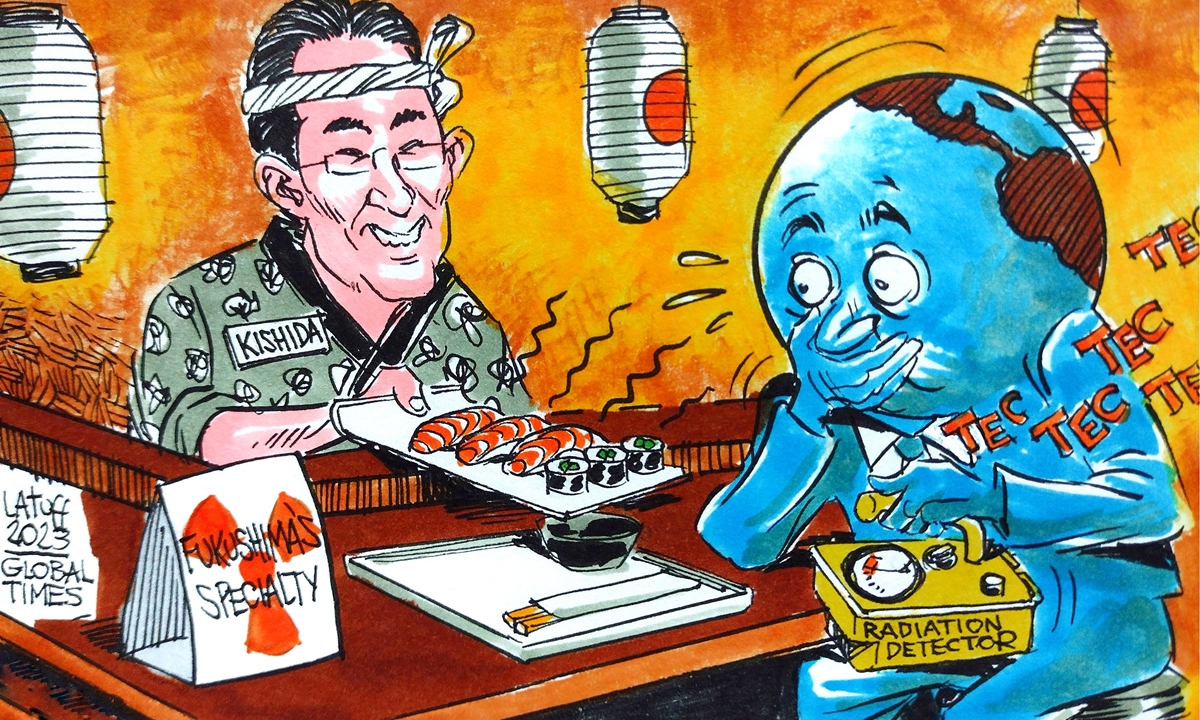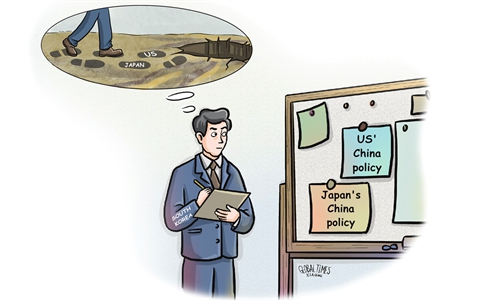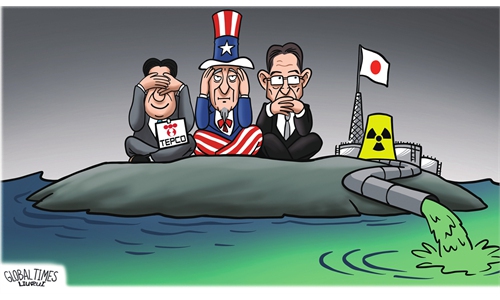Cities heighten Japan food inspections
Seafood alternatives from other countries surge

Japan serves special dish. Illustration: Carlos Latuff/Brazil
A campaign to increase inspection of seafood has been launched in many cities and regions across China since the country decisively suspended aquatic products from Japan, which started dumping nuclear-contaminated water into the ocean on August 24 and sparked backlashes at home and abroad.
Amid pressure over the seafood ban, Japan's Prime Minister Fumio Kishida suggested forming a joint expert group with China to study the issue, NHK reported Tuesday.
In response, Wang Wenbin, spokesperson for the Chinese Foreign Ministry, said at a press brief on Thursday that all along, based on science and facts, China has repeatedly expressed the opinions and concerns of its professional departments to the Japanese side in bilateral and multilateral exchanges.
"China and Russia have also submitted three joint technical lists to Japan, raising questions about the dumping of contaminated water. Instead of giving sincere answers and addressing our concerns, Japan has made groundless accusations over legitimate concerns from its neighbors and finally forcibly started the dumping. This is not the right attitude or approach to solve the problem," Wang stated.
If Japan is really sincere, it should immediately stop the dumping, fully communicate with stakeholders including its neighbors on all relevant issues, and address the concerns of its neighbors and the international community, Wang stressed.
While China calls the water from the damaged Fukushima Daiichi nuclear power plant "nuclear-contaminated water," Japan labels it as "treated water" in an attempt to whitewash the image of its dumping. On Thursday, however, Japanese Minister of Agriculture, Forestry and Fisheries Tetsuro Nomura "slapped Prime Minister Kishida's face" by accidentally calling the water "contaminated water." Kishida apologized for Nomura's remarks and instructed him to withdraw the statement, Asahi Shimbun reported.
Those remarks came as cities and regions across China strictly followed the national ban, with many launching increased inspections of seafood in recent days
The Macao Special Administrative Region (SAR) announced late on Wednesday that it had seized two batches of fresh oysters from Japan, which are prohibited from import, during a comprehensive inspection of food imports at the airport. This is the first seizure of banned seafood from Japanese prefectures.
Macao SAR started suspending aquatic imports from 10 Japanese regions including Tokyo, Fukushima and Miyagi on Thursday, the day when Japan began the dumping.
Also in Xiangyang, Central China's Hubei Province, the local market supervision authority carried out an inspection on Tuesday of seafood shops, supermarkets and restaurants.
The head of the market supervision bureau said that they will continue to pay attention to the impact of the Japanese dumping on food safety, increase supervision efforts, and carry out inspections regularly. No Japanese aquatic products were found after local officials checked purchase notes and customs declarations for imported goods.
Since the day of the full ban on Japanese seafood, many diners were rushing to eat their "last meal of Japanese seafood," an employee of an Izakaya, a Japanese-style pub, located in Beijing's Chaoyang district told the Global Times on Thursday.
The employee remained calm concerning the ban as he said most Japanese restaurants, especially mid- and low-end ones, use few Japanese-originated products and their most popular dishes are not sashimi or sushi at all.
The employee said after the ban, most Japanese restaurants started informing their customers about the origins of their seafood, making sure customers could make their purchases without worry.
"I occasionally went to high-end Japanese food restaurants where many aquatic products came from Japan. Although some tasted good, they were expensive. And some imported sashimi from other countries can replace Japanese ingredients, so it is not a pity at all if we can't eat Japanese seafood in the future," a sushi lover surnamed Wu said.
The ban on Japanese seafood has triggered a hot selling of alternatives from other countries and regions.
For example, the sales of South American white shrimp have surged. E-commerce platform Oriental Selection revealed that South American white shrimp sales have skyrocketed since Japan started dumping, media reported.
The shrimp saw more than 2.42 million orders on August 24, ranking first on the list of shrimp sales for the e-commerce supermarket on Douyin, the Chinese version of TikTok.
However, some netizens have expressed concern over possible imports of seafood from Europe that actually originated from Japan, as in early August the European Union removed its import restrictions on Japanese food that had been in place since the nuclear accident in Fukushima Prefecture in 2011.
"Although such cases should not be rampant, we should be vigilant, " Liu Jiangyong, vice dean of the Institute of Modern International Relations at Tsinghua University, told the Global Times.



